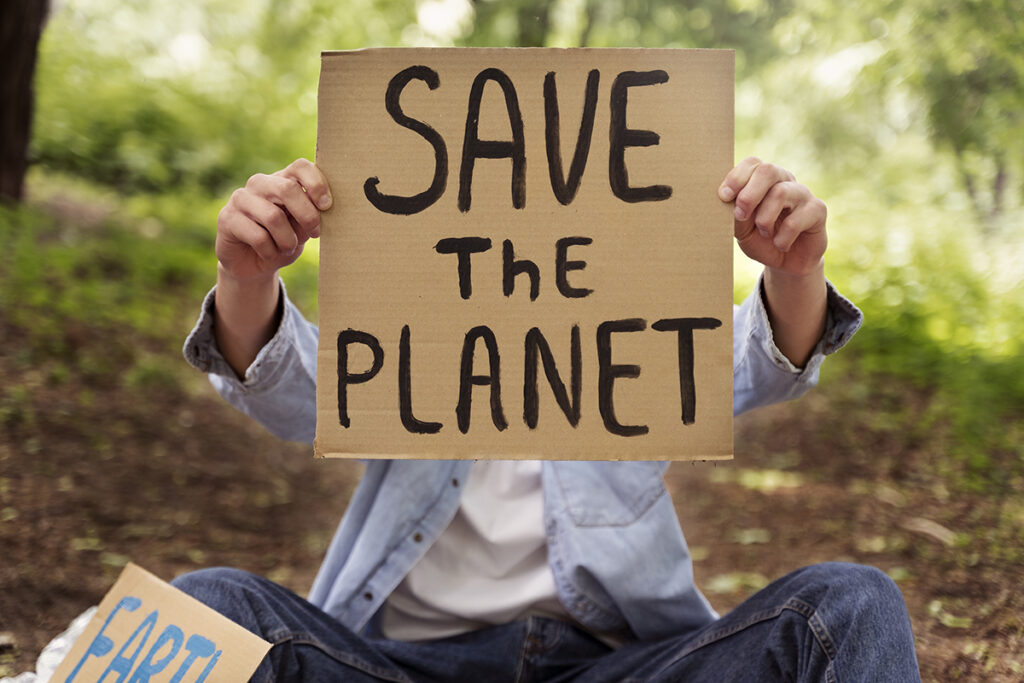By Kaden Cho
The climate crisis is no longer a far-off threat. It is here. The world is running out of time to avoid the worst impacts of climate change and yet, those with the most power and wealth continue to do the least.
Recently, the One Big Beautiful Bill Act of 2025 was signed into law, offering new tax deductions that primarily benefit the wealthy, who could be using their wealth to address climate injustice and invest in green energy.
From rising sea levels to deadly wildfires and record-breaking heatwaves, the consequences of inaction are no longer predictions, they are realities experienced most dramatically in the Global South and by people of color. The science is clear: without bold, immediate efforts to reduce emissions and transition to renewable energy, the future of our planet is at risk. But change requires funding, and policymakers constantly tell us there “isn’t enough money.” That’s simply not true.
According to Sen. Bernie Sanders’ 2020 proposal, a wealth tax on the richest 0.1% of Americans—those with over $32 million in net worth—could raise more than $4 trillion over the next decade. That amount could nearly cover the cost of shifting the U.S. to 100% renewable energy, as transformation experts estimate would cost $4.5 trillion. If passed, the wealth tax would impact only the ultra-wealthy while sparing 99.9% of Americans.
If we’re serious about solving the climate crisis, we must be willing to demand the wealthiest individuals, many of whom have profited from carbon-heavy industries, to fund the solutions. Why should the burden of climate action fall on working families, students, and future generations while billionaires enjoy record profits and tax breaks?
As a high school student, I see my peers organizing climate marches, calling legislators, and even suing governments for failing to protect our environment. Young people have consistently led the way in climate activism, from Greta Thunberg’s global school strikes to youth-led lawsuits and community organizing. We are not waiting for change, we are demanding it.
But we cannot vote. We do not hold political office. We do not write tax policy. It’s hard not to feel frustrated when teenagers are skipping school to protest for climate justice while billionaires launch themselves into space. Our generation is being asked to sacrifice our futures, while those with the most power continue business as usual. That should make anyone in a position of authority feel deeply uncomfortable, if not ashamed.
Some economists have proposed a carbon-based wealth tax, which would go even further by targeting wealth linked to polluting industries. Under this plan, investments in fossil fuels and high-emission sectors would be taxed at higher rates than investments in green technologies. The goal is not only to raise revenue but to push capital away from dirty industries and toward sustainable ones.
This approach makes sense, especially considering that just 57 companies are responsible for over 80% of global fossil fuel emissions since the 2016 Paris Agreement. Many of them are backed by American investors and financial institutions. If we want to be climate leaders, we need financial policies that reflect that responsibility.
Critics will say a wealth tax is too radical or too difficult to enforce. But the alternative (doing nothing) is far more dangerous. Climate change is not a distant threat; it is a present emergency. The United Nations warns that unless we act now, we will surpass 1.5°C of warming within the next decade. Scientists estimate that over a billion people could die from climate-related disasters over the next century if we fail to act.
Averting that future will take courage, cooperation, and funding. A wealth tax is not a silver bullet, but it’s a powerful tool to invest in clean energy, climate resilience, and global justice. Even for those who do not fall in the richest 0.1%, it doesn’t mean that you don’t also have a responsibility to advocate for laws and policies that support sustainability and climate justice, and to make individual choices that reduce waste (like use of AI, email, and gas), and to raise awareness toward collective action.
If billionaires can afford to buy private islands and spaceflights, they can afford to help fund a livable planet. And if young people are doing everything in our power to fight for the future, adults with real authority have no excuse for doing less.
Kaden Cho (he/him) is a high school senior. Outside of school, he’s an active member of his school’s debate club, where he enjoys exploring complex issues and sharpening his public speaking skills. When he’s not debating, you can find him immersed in comics or strategizing his next move in a video game.




